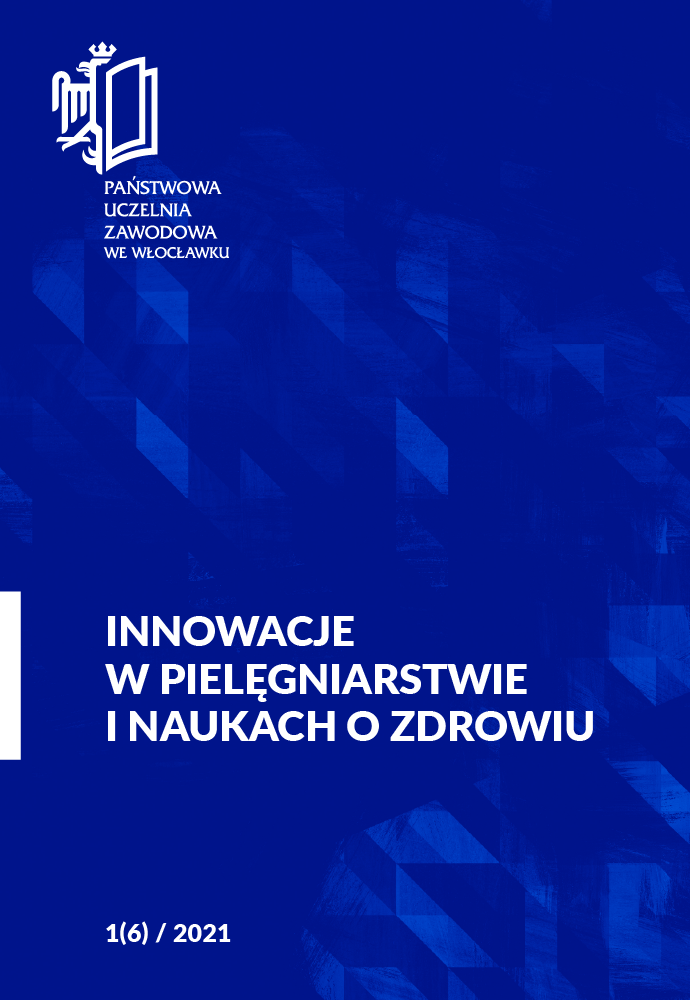Wpływ pracy w czasie pandemii covid-19 na stres personelu pielęgniarskiego
DOI:
https://doi.org/10.21784/IwP.2021.001Słowa kluczowe
stres zawodowy, poziom stresu, pandemia COVID-19, personel pielęgniarski, szpital niezakaźnyAbstrakt
Wstęp. Obciążenie stresem należy do poważnych zagrożeń zawodowych w pielęgniarstwie. Pandemia COVID-19 dodatkowo postawiła wiele nowych wyzwań przed personelem medycznym, co może powodować większe obciążenia psychiczne.
Cel. Celem badań była ocena wpływu pandemii COVID-19, na stres personelu pielęgniarskiego, niepracującego w bezpośrednim kontakcie z zakażonymi.
Materiały i metody. Badaniem objęto grupę 65 osób z personelu pielęgniarskiego, pracującego w siedmiu oddziałach szpitalnych. Wiek badanych mieścił się w zakresie 20–65 lat. W badaniach wykorzystano ankietę opracowaną na użytek badania oraz jedno standardowe narzędzia pomiaru, tj. Skalę Odczuwanego Stresu (PSS-10).
Wyniki. Wybuch pandemii spowodował zmianę w odczuwaniu stresu u 98,5% badanych. 89,2% osób zauważyło u siebie nasilone objawy stresu. Stres potęgowały przede wszystkim zmiany na poziomie organizacji pracy oraz lęk przed zakażeniem i przeniesieniem wirusa z pracy na rodzinę. U 6,2% badanych często pojawiały się myśli o rezygnacji lub zmianie pracy. Po roku pracy w pandemii, stres utrzymywał się na poziomie średnim i niskim.
Wnioski. Poziom odczuwania stresu, mierzonego rok po wybuchu pandemii, nie wskazuje na obciążenie nadmiernym stresem, a na fazę adaptacji w sytuacji kryzysowej. Skutki pracy w długotrwałym stresie mogą być widoczne dopiero w przyszłości. Wskazane jest dalsze monitorowanie stresu i objęcie personelu pielęgniarskiego wsparciem psychologicznym.
Bibliografia
Talarowska M., Chodkiewicz J., Nawrocka N. Zdrowie psychiczne a epidemia SARS-COV-2 - badania polskie. https://www.researchgate.net/publication/342845107_Mental_health_and_the_epidemic_SARS-COV-2_-_risk_factors_Polish_research_Zdrowie_psychiczne_a_epidemia_SARS-COV-2_-badania_polskie (dostęp: 29.05.2021 r.).
Dragan M. Zdrowie psychiczne w czasie pandemii Covid-19. Wydział Psychologii Uniwersytetu Warszawskiego. http://psych.uw.edu.pl/2020/05/04/zdrowie-psychiczne-w-czasie-pandemii-covid-19-raport-wstepny-z-badania-naukowego-kierowanego-przez-dr-hab-malgorzate-dragan (dostęp: 16.05.2021 r.).
Buchelt B., Kowalska-Bobko I. Zarządzanie zasobami ludzkimi w systemie ochrony zdrowia w czasach pandemii. Małopolska Szkoła Administracji Publicznej Uniwersytetu Ekonomicznego. Kraków 2020. https://politykipubliczne.pl/wp-content/uploads/2020/10/09-Ochrona-zdrowia_16.09.2020-last.pdf (dostęp: 16.05.2021 r.).
Molek-Winiarska D. Interwencje antystresowe w organizacji. Modele. Zarządzanie. Efektywność. Wydawnictwo Uniwersytetu Ekonomicznego. Wrocław 2020.
Wierzbiński P. Stres w dobie pandemii COVID-19 – subiektywna perspektywa psychiatry. Psychiatria i Psychologia Kliniczna 2020, 20 (2), p. 98–101. http://www.psychiatria.com.pl/index.php/wydawnictwa/2020-vol-20-no-2/stres-w-dobie-pandemii-covid-19-subiektywna-perspektywa-psychiatry?aid=933 (dostęp: 29.05.2021 r.).
Ogińska-Bulik N.: Negatywne i pozytywne skutki wtórnej ekspozycji na traumę wśród personelu medycznego ― rola wsparcia społecznego. https://journals.viamedica.pl/psychiatria/article/view/72596 (dostęp: 29.06.2021 r.).
Szambor T., Masiak J., Urbańska A. Związek pomiędzy sprawowaniem opieki medycznej nad osobami z chorobą COVID-19 a zdrowiem psychicznym pracowników ochrony zdrowia. Polish Journal of Public Health 2019;129(4): 145-147. http://search.ebscohost.com › login › sUUI (dostęp: 30.05.2021 r.).
Gawrych M. Zdrowie psychiczne pracowników medycznych w czasie pandemii COVID-19 – przegląd literatury. Psychiatria Polska Nr 215: 1–8, luty 2021. http://www.psychiatriapolska.pl/uploads/onlinefirst/Gawrych_PsychiatrPolOnlineFirstNr213.pdf (dostęp: 30.05.2021 r.).
Pobrania
Opublikowane
Jak cytować
Numer
Dział
Licencja
Prawa autorskie (c) 2021 Lech Grzelak, Piotr Szwarc

Utwór dostępny jest na licencji Creative Commons Uznanie autorstwa – Użycie niekomercyjne – Bez utworów zależnych 4.0 Międzynarodowe.
Statystyki
Liczba wyświetleń i pobrań: 9941
Liczba cytowań: 0
